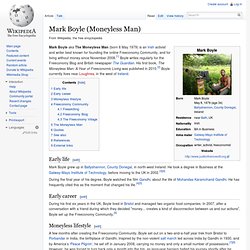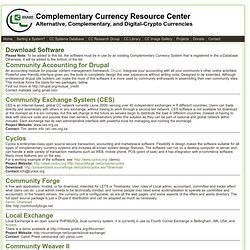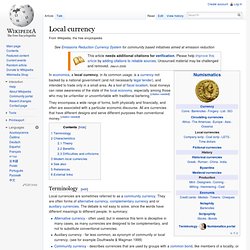

The Resource Based Economy. Mark Boyle (Moneyless Man) Mark Boyle aka The Moneyless Man (born 8 May 1979) is an Irish activist and writer best known for founding the online Freeconomy Community, and for living without money since November 2008.[1] Boyle writes regularly for the Freeconomy Blog and British newspaper The Guardian.

His first book, The Moneyless Man: A Year of Freeconomic Living was published in 2010.[2] Boyle currently lives near Loughrea, in the west of Ireland. Mark Boyle grew up in Ballyshannon, County Donegal, in north-west Ireland. He took a degree in Business at the Galway-Mayo Institute of Technology, before moving to the UK in 2002.[3][4] During his first six years in the UK, Boyle lived in Bristol and managed two organic food companies. In 2007, after a conversation with a friend during which they decided "money... creates a kind of disconnection between us and our actions", Boyle set up the Freeconomy Community.[6] Later in the same year, Boyle developed an alternative plan: to live without money entirely. Guide to Freeconomy - Episode 1. Cyclos - Open source on-line banking software. Complementary Currency Resource Center. Please Note: To be added to this list, the software must be in use by an existing Complementary Currency System that is registered in the ccDatabase.

Otherwise, it will be added to the bottom of the list. Community Accounting for Drupal An accounting module for popular content management framework, Drupal. Integrate your accounting with all your community’s other online activities! Powerful user-friendly interface gives you the tools to completely design the user experience without writing code. Community Exchange System (CES) CES is an internet-based, global CC network currently (June 2006) serving over 40 independent exchanges in 8 different countries.
Project Website: www.ces.org.za Contact: Tim Jenkin info (at) ces.org.za Cyclos Cyclos is enterprise-class open source secure transaction, accounting and marketplace software. For a working example of the software, see: (demo) Project Website: Download: Contact:info@cyclos.org. Alternative currency. An alternative currency (or private currency) is any currency used as an alternative to the dominant national or multinational currency systems (usually referred to as national or fiat money). They are created by an individual, corporation, or organization, they can be created by national, state, or local governments, or they can arise naturally as people begin to use a certain commodity as a currency.
Mutual credit is a form of alternative currency, and thus any form of lending that does not go through the banking system can be considered a form of alternative currency. When used in combination with or when designed to work in combination with national or multinational fiat currencies they can be referred to as complementary currency. Most complementary currencies are also local currencies and are limited to a certain region. Barters are another type of alternative currency. Often there are issues related to paying tax. Local currency. See Emissions Reduction Currency System for community based initiatives aimed at emission reduction In economics, a local currency, in its common usage, is a currency not backed by a national government (and not necessarily legal tender), and intended to trade only in a small area.

As a tool of fiscal localism, local moneys can raise awareness of the state of the local economy, especially among those who may be unfamiliar or uncomfortable with traditional bartering. [citation needed] They encompass a wide range of forms, both physically and financially, and often are associated with a particular economic discourse. All are currencies that have different designs and serve different purposes than conventional money. Terminology[edit] Local currencies are sometimes referred to as a community currency. Characteristics[edit] Theory[edit] Advocates[who?] Benefits[edit] The Wörgl experiment dramatically illustrates some of the common characteristics and major benefits of local currencies.[1] 1. 2. 3. Money and Banking. Learn Skills, share tools, save money and make great new friends. Streetbank is very like Justfortheloveofit.

It lets you share things and skills with your neighbours and join in with community discussions. If you'd like to move your Justfortheloveofit account over to Streetbank, just enter your email address below and we'll pull your details across. Enter your email here Why is this happening? Justfortheloveofit.org has grown very large very quickly, in fact there are over 50,000 of you! Is Mark still involved? Yes, Mark is now part of the Streetbank leadership team.
Tell me more about Streetbank Streetbank and Justfortheloveofit are very similar, with similar aims, and ideals. Can I still use the old site? You can still reach the old site for a limited time from here if you need to read it or find some information.